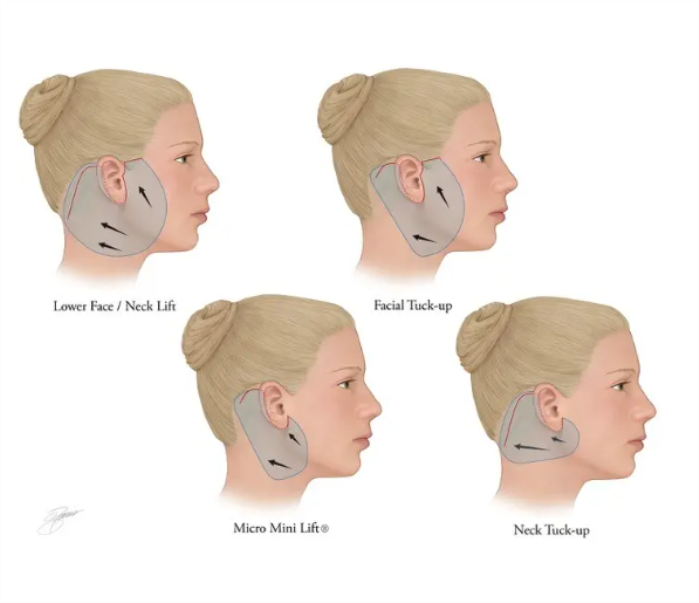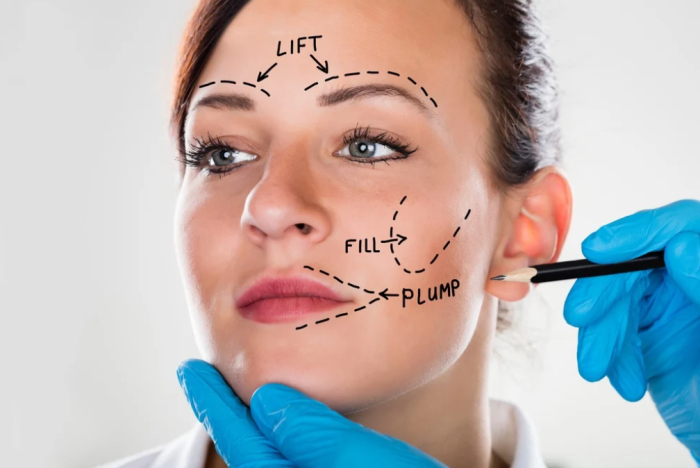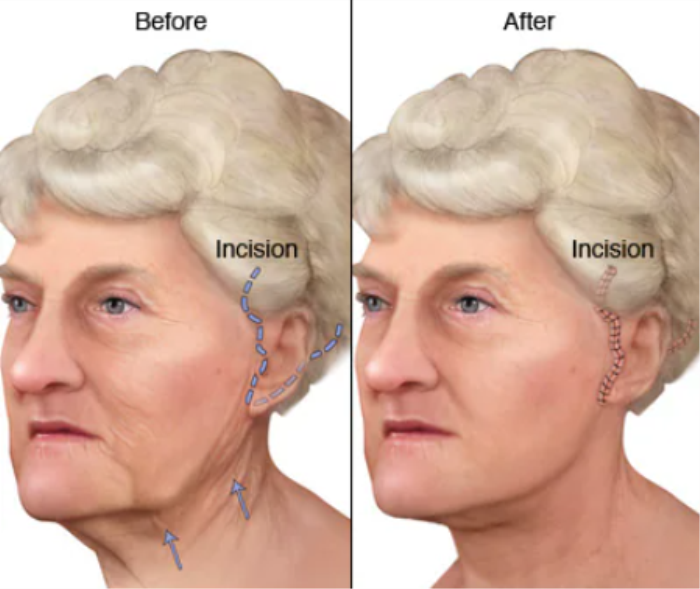Facelift surgery in India is a popular cosmetic procedure aimed at rejuvenating the facial appearance by tightening sagging skin and reducing wrinkles. This surgery is sought after by individuals looking to enhance their youthful appearance with natural-looking results. With advanced medical facilities and experienced surgeons, facelift surgery in India offers a cost-effective option without compromising on quality, attracting both domestic and international patients.
Understanding Facelift Surgery
What is Facelift Surgery and How Does it Work?
Facelift surgery is a cosmetic procedure designed to lift and tighten facial tissues, resulting in a more youthful appearance. It involves removing excess skin, tightening underlying muscles, and repositioning the skin on the face and neck. This procedure effectively reduces wrinkles and sagging, providing natural-looking rejuvenation.
When is Facelift Surgery Necessary?
Facelift surgery is necessary when signs of aging, such as deep wrinkles, sagging skin, and loss of facial contours, become prominent and non-surgical treatments are no longer effective. It is often chosen by individuals seeking a more youthful and refreshed appearance.
Different Types of Facelift Surgeries
Different types of facelift surgeries include traditional facelifts, mini facelifts, and mid-facelifts, each targeting specific areas of the face. These procedures vary in their approach and extent, allowing for customization based on the patient's individual needs and desired outcomes.

The Facelift Surgery Procedure
Pre-Surgery Evaluation Process
The pre-surgery evaluation process for facelift surgery involves a thorough assessment by a qualified surgeon, including a review of the patient's medical history, physical examination of the facial structure, and discussion of aesthetic goals. This evaluation ensures that the patient is a suitable candidate for the procedure and helps in planning the most effective surgical approach.

Choosing the Right Type of Facelift Surgery
Choosing the right type of facelift surgery depends on factors such as the extent of facial aging, the areas that need improvement, and the patient’s overall health and aesthetic goals. A consultation with a skilled surgeon helps in determining whether a traditional facelift, mini facelift, or mid-facelift is the most appropriate option for achieving desired results.
Detailed Surgical Procedure for Facelift
The detailed surgical procedure for a facelift involves making incisions around the hairline and ears, lifting and tightening the underlying facial muscles, and removing excess skin. The remaining skin is then carefully repositioned for a smoother, more youthful appearance, followed by suturing to close the incisions.
Post-Surgery Care and Recovery
Post-surgery care and recovery after a facelift surgery involve following the surgeon’s instructions, including managing swelling and discomfort, keeping the head elevated, and avoiding strenuous activities. Proper care during recovery is crucial for optimal healing and achieving the best possible results from the procedure.
Top Hospitals for Facelift Surgery in India
Leading hospitals for facelift surgery in India include top-tier institutions such as Apollo Hospitals, Fortis Healthcare, and Medanta. These hospitals are renowned for their experienced plastic surgeons, state-of-the-art facilities, and comprehensive care, making them popular choices for both domestic and international patients seeking facelift surgery.
Best Facelift Surgeons in India
India boasts some of the top facelift surgeons, including Dr. Srinjoy Saha in Kolkata, Dr. Karthik Ram in Bangalore, and Dr. Arjun Handa in New Delhi. These experts are renowned for their advanced techniques and excellent patient outcomes.
Cost of Facelift Surgery in India
The cost of facelift surgery in India varies widely based on factors such as the hospital's reputation, the surgeon’s experience, and the complexity of the procedure. On average, it ranges between ₹2,00,000 to ₹5,00,000, making it a cost-effective option compared to many Western countries while still offering high-quality care.
Success Rates and Survival Statistics for Facelift Surgery in India
Success rates for facelift surgery in India are generally high, with most patients experiencing significant improvements in facial appearance and satisfaction with results. Complications are rare when performed by experienced surgeons, and the survival statistics are favorable, making it a reliable option for cosmetic enhancement.
Legal and Ethical Considerations for Facelift Surgery in India
Legal and ethical considerations for facelift surgery in India include ensuring that the procedure is performed by a certified and experienced surgeon, obtaining informed consent, and adhering to regulatory standards for patient safety and privacy. It is crucial to choose a reputable hospital that follows ethical practices and provides transparent information about potential risks and outcomes.
Preparing for Facelift Surgery
Lifestyle Changes Before Facelift Surgery
Before facelift surgery, lifestyle changes such as quitting smoking, avoiding alcohol, and maintaining a healthy diet can improve healing and surgical outcomes. Additionally, it's important to follow pre-surgery guidelines provided by the surgeon, which may include discontinuing certain medications and preparing for a post-surgery recovery period.
Medications and Treatments Required for Facelift Surgery Patients
For facelift surgery patients, medications and treatments typically include pain relievers, antibiotics to prevent infection, and anti-inflammatory drugs to manage swelling. Patients may also need specific ointments or dressings as prescribed by the surgeon to aid in healing and ensure proper recovery.
Importance of Support Systems and Counseling for Facelift Surgery Patients
Support systems and counseling are crucial for facelift surgery patients to ensure emotional well-being and a smooth recovery. Having a supportive network helps manage expectations, reduces anxiety, and aids in coping with the physical and emotional changes post-surgery. Professional counseling can also assist in addressing any psychological impacts and enhancing overall satisfaction with the results.
Life After Facelift Surgery
Recovery Process After Facelift Surgery
The recovery process after facelift surgery involves managing swelling and bruising, following post-operative care instructions, and attending follow-up appointments. Patients should expect some discomfort and need to rest with their head elevated while avoiding strenuous activities. Adhering to the surgeon’s guidelines is essential for optimal healing and achieving the best possible results.

Long-term Care and Monitoring After Facelift Surgery
Long-term care and monitoring after facelift surgery involve regular follow-up visits to assess healing and address any concerns. Patients should continue to protect their skin from sun exposure, maintain a healthy lifestyle, and adhere to any ongoing care instructions from their surgeon to preserve results and ensure long-term satisfaction.
Potential Risks and Complications of Facelift Surgery
Potential risks and complications of facelift surgery include infection, bleeding, scarring, and asymmetry. Other concerns can be delayed wound healing and temporary numbness. Choosing a skilled surgeon and following pre- and post-operative instructions can help minimize these risks and ensure a smoother recovery.
Latest Advancements in Facelift Surgery
Minimally Invasive Techniques in Facelift Surgery
Minimally invasive techniques in facelift surgery, such as endoscopic facelifts and thread lifts, involve smaller incisions and less disruption to surrounding tissues. These methods offer quicker recovery times, reduced scarring, and often more subtle results, making them ideal for patients seeking less dramatic improvements with shorter downtime.

Use of Advanced Imaging for Better Outcomes
The use of advanced imaging technologies, such as 3D simulations and digital planning, enhances outcomes in facelift surgery by providing detailed visualizations of potential results. This allows surgeons to tailor the procedure to the patient's specific anatomy and aesthetic goals, improving accuracy and patient satisfaction.
Development of Advanced Surgical Tools
The development of advanced surgical tools, such as precision scalpels and minimally invasive instruments, has significantly improved facelift surgery. These tools enhance precision, reduce tissue damage, and contribute to quicker recovery times, leading to better overall outcomes and more refined aesthetic results.
Frequently Asked Questions (FAQs) about Facelift Surgery
What is the success rate of facelift surgeries in India?
The success rate of facelift surgeries in India is generally high when performed by qualified and experienced surgeons. Most patients experience significant improvements in their facial appearance with minimal complications, provided they follow post-operative care instructions and have realistic expectations.
How long is the hospital stay after facelift surgery?
After facelift surgery, the typical hospital stay ranges from 1 to 2 days. The duration depends on the complexity of the procedure and the individual’s recovery progress. Some patients may be discharged sooner if they are recovering well.
What is the cost of facelift surgery in India?
The cost of facelift surgery in India generally ranges from ₹2 lakh to ₹5 lakh. This variation depends on factors such as the extent of the surgery, the hospital’s reputation, and the surgeon's experience. It's advisable to obtain a detailed estimate from the chosen facility.
What are the eligibility criteria for facelift surgery?
Eligibility for facelift surgery includes having visible signs of facial aging, being in good overall health, and having realistic expectations about the outcomes. A thorough evaluation by a qualified surgeon will help determine suitability for the procedure.
What is the recovery time after facelift surgery?
The recovery time after facelift surgery typically ranges from 2 to 4 weeks. Most patients can resume normal activities within this period, although full recovery may take longer, depending on individual healing rates and adherence to post-surgery care.
What are the risks and complications associated with facelift surgeries?
Potential risks and complications of facelift surgery include infection, scarring, and issues related to anesthesia. Patients should discuss these risks with their surgeon and follow all pre- and post-operative instructions to minimize complications.
How do I find a suitable hospital for facelift surgery in India?
To find a suitable hospital for facelift surgery in India, consult with your doctor for recommendations and research top hospitals known for their experienced plastic surgeons. Consider facilities with a strong reputation for quality care and positive patient outcomes.
What kind of post-surgery care is required after facelift surgery?
Post-surgery care includes taking prescribed medications, attending regular check-ups, and following detailed post-operative care instructions. Patients should monitor their recovery, avoid strenuous activities, and adhere to their surgeon's recommendations for optimal results.
Are facelift surgeries covered by insurance in India?
Facelift surgeries are generally considered cosmetic procedures and are not covered by health insurance in India. It is advisable to check with your insurance provider for specific details and explore any potential financing options if needed.
Where can I find support groups for facelift surgery patients in India?
Support groups for facelift surgery patients can be found through hospitals, cosmetic surgery clinics, and online communities. These groups provide valuable resources and support for individuals undergoing or recovering from facelift surgery.